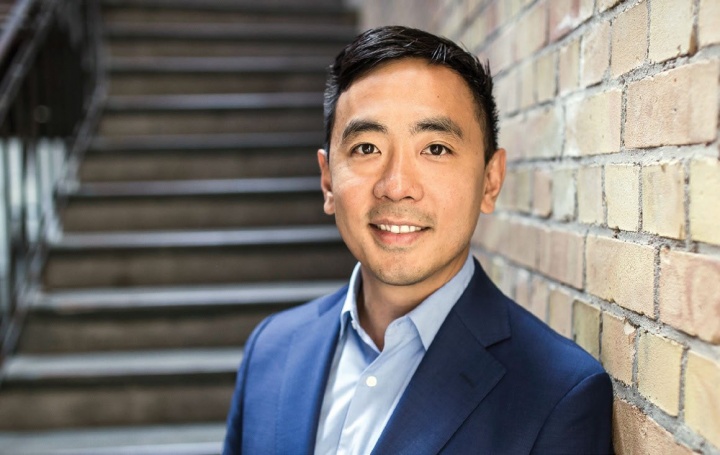Columbia College | Columbia University in the City of New York
Wayne Ting ’06’s Electric Journey

COURTESY LIME
“It was an absolutely challenging time,” recalls Ting. He had to suspend service in 100 of Lime’s 250 cities and lay off 100 workers, nearly 15 percent of the workforce. “I had to keep the faith and keep fighting through, because there were definitely many days where it looked very bleak and very dark.” The company came close to running out of cash. But late last year Lime raised $523 million in investments from big names like Uber and Fidelity, and things are beginning to look up.
And Lime’s success is good news for the environment. According to the company’s market research, the average Lime trip produces less than 7 percent of the carbon emissions of an equivalent car trip, and as many as 40 percent of Lime trips would have been in cars. (The company’s name, aside from being a slight hat tip to Apple’s fruity moniker, reflects its core mission to help the environment.) “Climate change is worsening faster than expected, and we’re getting close to the point of no return. Cars are the number 1 source of carbon pollution in the United States. We absolutely cannot continue on the path of using cars as the primary mode of transportation,” says Ting.
His entrepreneurial zeal first showed itself at the College, where he co-founded the social networking venture CU Community, later known as Campus Network. It launched in 2003 — six months before Facebook — and most Columbia students soon had accounts. But Facebook was easier to use, a fact that helped doom his service. Looking back on what he learned from the experience, Ting says, “Ideas are cheap. Execution is everything. You’ve got to meet your customers where they are.”
After graduation, he landed at consulting powerhouse McKinsey & Co. and then at private investment giant Bain Capital. But he felt little passion in those roles. “If you don’t believe in what you’re doing, there are plenty of people way smarter than you who are going to outcompete you,” he says. After earning an M.B.A. at Harvard, Ting realized he was “super happy” working in the Obama administration for less pay as a senior policy advisor on the National Economic Council.
Today he provides what he calls “optimistic leadership” at Lime: “If you don’t believe you can change the future, that today doesn’t have to look like tomorrow, that our collective hard work can’t change the course of what’s to come, you’re not going to make it.”
That optimism has paid off: Lime has rocketed back to health since those early Covid lows. Trips are up 75 percent (back to 2019 levels), and Ting says that Lime’s market share and margins are dramatically higher.
The son of Taiwanese immigrants, Ting sees parallels between his parents’ journey and his risk-taking role running a new company. “You have to — without knowing what’s on the other side — bet the farm, take a chance on yourself, keep fighting and believe tomorrow’s going to be a better day,” he says. “There’s such optimism in every immigrant. I believe the American Dream is optimistic leadership. That is the heart of it.”
George Spencer is the former executive editor of Dartmouth Alumni Magazine. He lives in Hillsborough, N.C.
Issue Contents
Published three times a year by Columbia College for alumni, students, faculty, parents and friends.
Columbia Alumni Center
622 W. 113th St., MC 4530, 6th Fl.
New York, NY 10025
212-851-7852
cct@columbia.edu
Columbia Alumni Center
622 W. 113th St., MC 4530, 4th Fl.
New York, NY 10025
212-851-7488
ccalumni@columbia.edu

